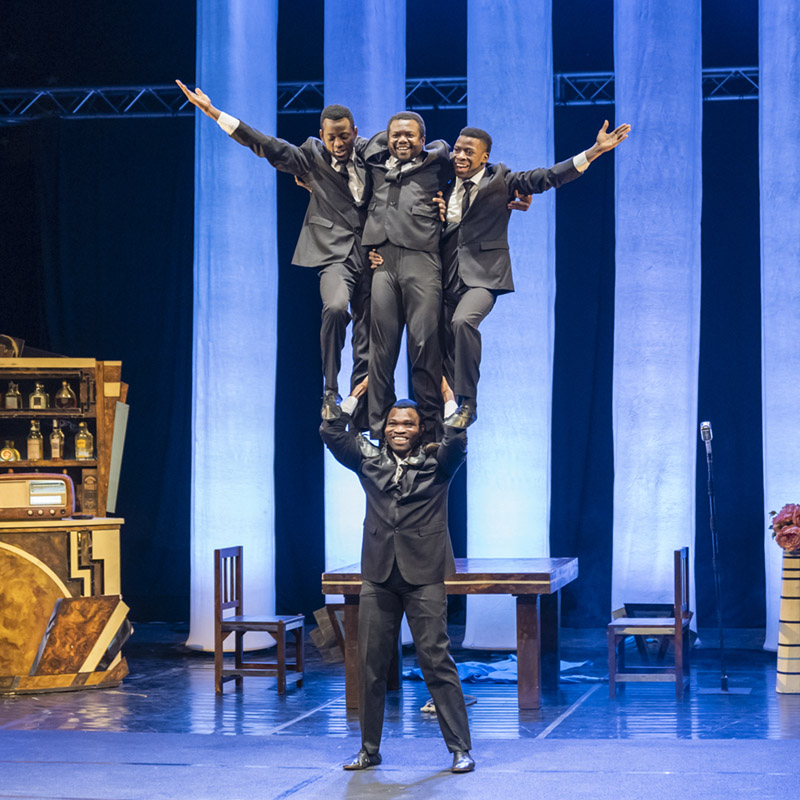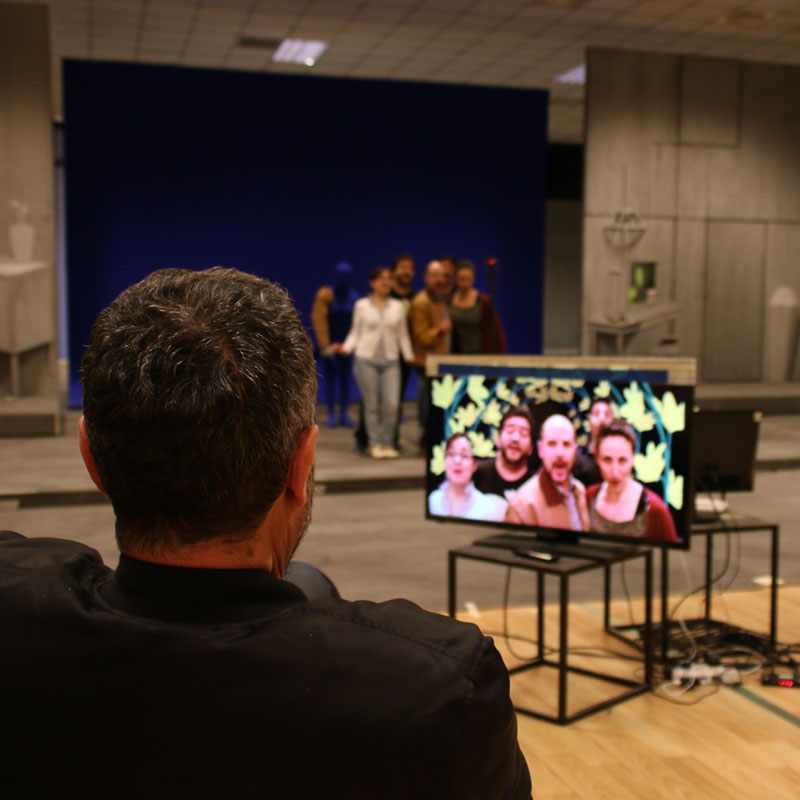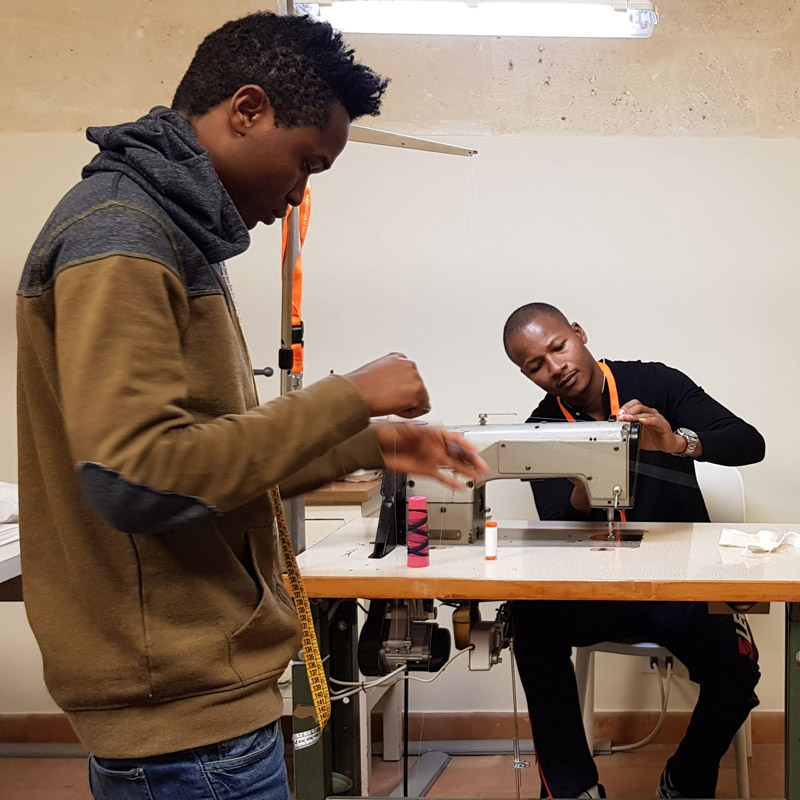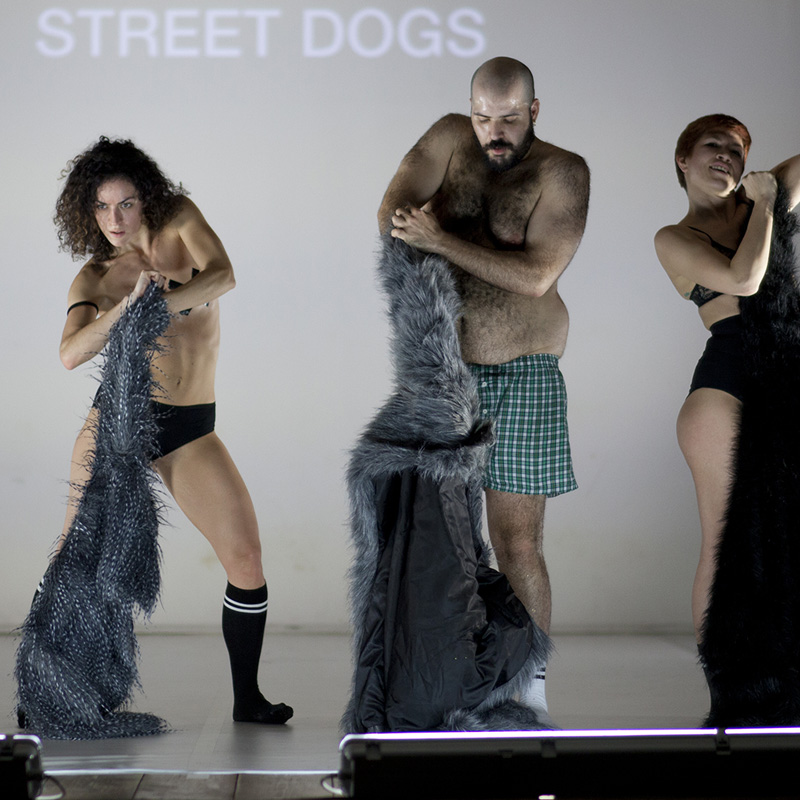Home
Circus+, The Big Numbers of the Festival

The Circus+ festival closes having achieved great interest and participation with the numbers saying it all. 5 weekends of shows dedicated to the 5 themes of the candidacy bid-book during which the Matera 2019 audience watched the most amazing and riveting circus shows in Europe.
23 international circus companies were involved along with 112 artists coming from 10 different countries and from the South of Italy, and 5 bands took turns on stage at both the Grand Chapiteau (Big Circus tent) and the Petit Chapiteau (Small Circus tent) from 14 February to 17 March.
A packed programme of sold out events - 37 shows, 6 events including the presentation of a book and projections of films about the circus world as well as tens of shows with about 10,000 audience members who were welcomed heartily by 160 enthusiast volunteers. Moreover, Matera 2019 social media reported a huge number of reach and online engagement. Pictures, videos and the whole livestream of one of the performances reached 19,000 Facebook views, 3021 Linkedin views, and obtained 275 Instagram likes on average as well as 1594 views on the Youtube channel.
The artists used many traditional and unusual tools and equipment, such as ropes, cords, trapezes, fabrics, clubs, bolas, balls, ladders, spheres, Chinese plates, hats, magic ropes, mini bikes, rola bolas, roue cyrs, hula hoops, unicycles, Chinese poles, diabolos, comic balls, lampshades, spinning ropes, water hoses, plastic bags and whirling skirts.
During the first weekend the first act named Circus as transformation was dedicated to Roots and Routes, the theme of the candidacy bid-book that links tradition to its contemporary forms. The shows are the outcome of the contamination of different cultures and disciplines melting with performing arts, which range from dance to theatre.
Two couples of artists, with different knowledge and vocations, performed in an avant-garde synthesis. The actor and performer Antonio Rezza and the artist and author Flavia Mastrella, the Uruguayan aerial acrobat Fabiana Ruiz Diaz and the Italian multidisciplinary artist Giacomo Costantini of the company El Grito took turn on stage.
Water, wind and other natural elements were the protagonists of the shows of the second act, Circus as transition, dedicated to Utopias and Dystopias, the theme of the change. This week, Phia Menard, who gave two performances, and the dervish Ziya Azazi also dominated the circus stage.
During the third weekend, the third act named Circus as aggregation was dedicated to the theme of Continuity and Disruptions and we set up gymnastics shows in which the tools were works of art and merged with the artists. Three international artists stepped up: the French Cécile Mont Reynaud, the Italian Martina Nova and the German Jorg Muller followed by the Belgian Clown Duo Okidok.
The team spirit that characterises the best circus groups was the focus of the fourth act titled Circus as collaboration. The artists demonstrated mastering arts and disciplines which require coordination and overall view. It was a reminder of the collective intelligence in order to challenge human abilities. The show by Groupe Acrobatique de Tanger, which is made up of 12 acrobats and 2 musicians from Morocco, defies the law of gravity in collective and exhilarating acrobatics whilst the Forum Nuovi Circhi gathered almost all the Italian Contemporary Circus companies: Circo Paniko, MagdaClan Circo, Side Kunst Cirque, Circo Zoé, Arterego, Circo Krom, Circo Patuff, Teatro Nelle Foglie, L'Iglù and Circo Baraka with 46 elements overall.
In Circus as innovation, which is the fifth act linked to the theme of Ancient Future, circus tradition was challenged through the contamination of arts by five out-of-control acrobats/dancers The Black Blues Brothers, Mister David and The Family DEM and El Grito.
See the pictures of all the performances and the video tale of the whole Circus +.
European Circostrada Network and European CircusNext Label collaborated to Circus+ .
Circus+ is supported by the Embassy of France and the Institut Français.
Call for Artists - we are looking for the protagonists of Cavalleria Rusticana

Update 27 June 2019
The results of the Call for Artists are available online.
Inhabiting the Opera is a project co-produced with one of the oldest theatres in the world, the Theatre San Carlo in Naples, which intends to stage “Cavalleria Rusticana” by Pietro Mascagni in the heart of the Sassi districts from 2nd August to 11th August.
Experimenting with a new model for culture production and valorisation, citizens will be involved in this project that is mainly focused on strengthening cultural citizenship and direct community participation.
The Opera will be performed outdoors and the audience will be engaged in writing the script of the Opera that will be set in a contemporary context.
The itinerant performance will be made up of two parts. In the first part the protagonists will be involved in choirs, collective dances and theatre actions in a "Prologue on the Sassi" titled ‘THE SEVEN CAPITAList SINS. The disasters caused by Neoliberism”. During the second part the real performance of the Opera by Mascagni, directed by Giorgio Barberio Corsetti, will be staged in the beautiful setting of Piazza San Pietro Caveoso dominated by the Church of Santa Maria di Idris.
Actors, dancers, parkourers and street dancers are invited to apply for the development of the Prologue for the creation of the Opera.
Applicants should email their CVs and a self-introduction video by 7th April. The auditions to select the candidates will be held at the Theatre San Carlo of Naples from 13th April to 14th April. The selected artists will attend two workshops in Matera. The first workshop will be held from 22th April to 30th April for a further selection of artists. The second workshop will be held from 17th June to 22nd June.
The artists selected during the two workshops will take part in the rehearsals and in the performance planned from 3rd July to 11th August.
Details about the application are available in the transparent administration section of our website. During the auditions the director will give further information about the artistic performance.
Great Success for Silent Academy and the Sewing Workshops, Performances and Installations

Wuyeh and Savane are both tailors. Wuyeh is a young Gambian boy who arrived in Italy when he was a child, after moving from place to place for two years. Savane, instead, had to escape from the Ivory Coast because he made suits for an important politician and at the outbreak of the war, his name was on the list of the people to be persecuted. Trèsor was enrolled in the faculty of architecture and managed a building company in the Congo that employed 20 citizens. He left his country with his children and his wife who died at sea during their journey. Tessy is a Senegalese single mother and Mohammad is a Pakistani boy who escaped from the Taliban, who wanted to kill him because he was involved in rescue activities during big disasters on behalf of an NGO.
These are just a few stories that the Silent Academy tells through everyone’s skills and abilities within a project relying on the values of equality, integration and contamination among different cultures. Nowadays, immigration is one of the key issues in National and European debates whilst elsewhere walls are being built and bridges are being destroyed. Matera 2019 and Il Sicomoro, which is a social cooperative set up in 2002 to give voice to “Silent people”, respond with a message of inclusion starting from the awareness that talents are everywhere in the world.
Matera 2019 Silent Academy enhances the migrants’ artisan skills within hosting communities. It has set up a school of craft skills to foster the acknowledgement of professions of those people who escape from war and famine as well as to acknowledge the professional experiences acquired in their countries of origin, which they skillfully use within their new homes.
The workshops are held by a migrant teacher and a local expert, who together with participants gather skills and traditions to make products with a new identity. Savane and Wuyeh are the tailors of the sewing workshops, Trèsor will be one of the experts in decoration and plastic design, Mohammad works Matera’s tufa stone and Tessy has participated in a fashion parade along the streets of the city. She wore a golden dress made with the fabric of an isothermal blanket, which is the same type of blanket that migrants put on when they arrive ashore. This golden dress was made by the Ivorian tailor Ibrahim and the artist BR1 from Turin.
Following a co-creation and capacity building process, the Silent Academy made its debut from last June to July. It organized 20 days of public art and social craftmasnhip during which collective works were made together with foreigners and local people coming from different towns of Basilicata: Rionero in Vulture, Nova Siri, San Chirico Raparo and Matera. It was a journey through the places, the histories of the towns and the people living in them, regardless of their skin colour.
In 2019 a long series of workshops opened to all the holders of the Matera 2019 Passport and involved 230 temporary citizens. On 20 March the first performance titled Sotto lo stesso manto (Under the Same Cloak) will be staged. The clothes made by the fashion designer Eloi Sessou will be worn for a collective performance curated by Mariano Bauduin, which takes inspiration from an ancient icon of the town of Matera, “la Madonna del Terzo Settore”.
A modern “symphonic poem” specially composed by Bauduin and performed by the wind Orchestra from Grottole and by "Corale per San Giovanni" from Naples will celebrate diversity searching its harmony, from the “tamurriata” (translator’s note:the dance on the drum, typical folk dance of Campania) for the Virgin Mary, to a revised orchestration of “Missa Luba”, created in Afro-American form.
This event is inspired by a big seventeenth-century painting (la Madonna del Gonfalone) which hangs at the back of the church. The painting depicts the Virgin Mary wearing a special cloak, who is the Matera icon belonging to the fraternity which bear the same name. This painting shows the brothers on one side and on the other the “entrusted” - the poor and the forgotten. They are all under the same cloak and the fraternity helps and “entrusts” them to the “Mother”.
An installation evoking the scenic action will be set up in the Church of Santa Maria of Costantinople, within the complex of the Museo Diocesano (Diocesan Museum), where it will be possible to admire the original painting the event took inspiration from until 24 March.
This event will start the restoration of the big painting of "Madonna del Gonfalone", which will be funded by the social cooperative Il Sicomoro.
Information about the project, the events organised by Silent Academy and the ways you can participate in the next workshops are available on both the Matera 2019 website and on the Il Sicomoro website in the project-related sections.
Silent Academy tries to tell a different story about immigration - a new story made up of opportunities rather than resentment, of humanity rather than divisions. Culture belongs to everybody. This is what Silent Academy wants to tell us.
‘Humana Vergogna’ is the final event in the first phase of the project ‘Poetry of Shame’.

The project The Poetry of Shame has completely reached its goal, which is telling the story of a “redemption” through theatre and performative language. It showed that when we reverse our shameful and vulnerable side we can unlock our human potential.
The project is co-produced by #reteteatro41, with Franco Ungaro as coordinator and Antonella Iallorenzi of ‘Petra’ theatre company as art director. Together with the theatre company ‘L’albero’, ‘IAC Centro Arti Integrate’ and ‘Gommalacca Teatro’, Antonella has founded #reteteatro41, a cultural organisation that develops relations and actions supporting territories, institutions and operators at regional, national and international level.
The project is included in the theme ‘Continuity and Disruptions’ and follows the relevant guidelines planned in the Candidacy bidbook. It investigates the concept of shame as a positive impulse towards a collective process of self-analysis, self-criticism and self-improvement, which can generate new strength and greater optimism about the future.
This important theme is based on the assumption that the investigation on shame, which characterised the history of both Matera and whole of Europe, may lead to change its meaning, by starting up a dialogue among different cultures and creating connections between Eastern and Western Europe in order to build up a common cultural area based on shared values.
Humana Vergogna was staged from 1st to 9th March. It was also performed at Teatro Paisiello in Lecce on 11th March. It is the outcome of a long process of artistic research and creation that has turned shame into beauty. Shame is seen from a range of perspectives – shame for one’s own body, family, failure, sex as well as for being different. The live performance brought art into the jail of Matera and, despite its apparent lightness, it dealt with the innermost features of our identity.
The investigation on the word ‘shame’ starts from a deep analysis carried out by performers which then explodes in entwined bodies that explore every nuance of the theme through dance moves and thundering words accompanied by a soundtrack mixing pop music and opera. Daily fragility, humiliation and embarrassment, private and collective shame – all of them find a place in this sparkling performance that provides a careful and sensitive analysis of the most intimate of human shame and of the relevant poetic visions.
The ad hoc production was entrusted to Matteo Maffesanti and Silvia Gribaudi. The latter has been working for years on the embarassment experienced by people with “conspicuous” bodies. Her work aims at freeing them from stereotypes and desecrating them with beauty. The performers, including actors and dancers, were selected during the artistic residence that took place in Skopje from November to December 2018. Artists include Mattia Giordano, Antonella Iallorenzi and Mariagrazia Nacci, from Basilicata, Simona Spirovska from Macedonia and Ema Tashiro from Japan. On their return from the capital of the Republic of North Macedonia, the artists started to work on the performance in the village of Satriano di Lucania where they engaged the local community in theatre and shared ideas and suggestions on the concept of shame with citizens and students.
‘Humana Vergogna’ is part of the project ‘The Poetry of Shame’. It is the result of a process in performing arts, which was started with workshops held at the ‘Accademia Mediterranea dell’Attore’ of Campi Salentina (Lecce) last year. In this first phase, open calls addressed to international actors, dancers and performers were announced with the aim of giving young artists a chance of training abroad and of contributing with their critical work to the development of the idea underlying the project.
The first workshop, was held from 8th to 12th May and directed by Massimiliano Civica, who was awarded the Ubu Prize in 2016 and in 2017. The second workshop took place from 3rd to 7th November and was directed by Radoslaw Rychcik, one of the most renowned directors of Polish theatre.
In the second phase of the project, the research continued with the workshop ‘Shamelab’, held in the jail of Matera from 19th September to 23rd November by Antonella Iallorenzi, an expert on social theatre and founder of #reteteatro41. The workshop’s aim was to investigate, with the prisoners, the word ‘shame’ and play with the connected stereotypes in order to break the pattern and free the mind. The research ended with a performance open to the public, an intense and evocative moment that joined prisoners and the community of Matera.
During the third phase of the project an artistic residence took place in Skopje at the end of 2018 with the collaboration of partners from the Balkans. The artists to be involved in the performance were selected during the drama workshop led by Sharon Fridman, the top dancer and choreographer in contemporary Israeli dance, and in the dance-theatre workshop led by the former director of the National Theatre of Kosovo, Jeton Neziraj, and the coreographer, director and performer Silvia Gribaudi.
Besides theatre workshops and performances, the research planned in the project ‘The Poetry of Shame’ was carried out also through international meetings involving renowned people in the Balkan and European culture and theatre. The first meeting was held in Matera at the beginning of November. Its aim was to deepen the reflection on ‘shame’ in a multidisciplinary context involving cinema, literature, anthropology, poetry and architecture thanks to the contributions by Mario Desiati, Mario Bianchi, Giuliano Geri, Misumi Misuki, Cristina Amenta, Stephanie Schwandner-Sievers e Fatos Lubonja. The second meeting was held in Skopje and was aimed at talking about the connections between the capital of the Republic of North Macedonia and Matera, moving beyond national borders and shame towards an open Europe. The third meeting was held in Matera at the end of the first performance and focused on the theme of internationalisation of arts. It saw the participation of international art directors and programmers supporting the dissemination of the performance.
This is the end of the co-creation work with #reteteatro41, which started from the long capacity building programme that Matera 2019 created in order to strengthen practices that remain on the Lucanian territory, thus leaving a significant legacy even beyond the year as European Capital of Cuture.





